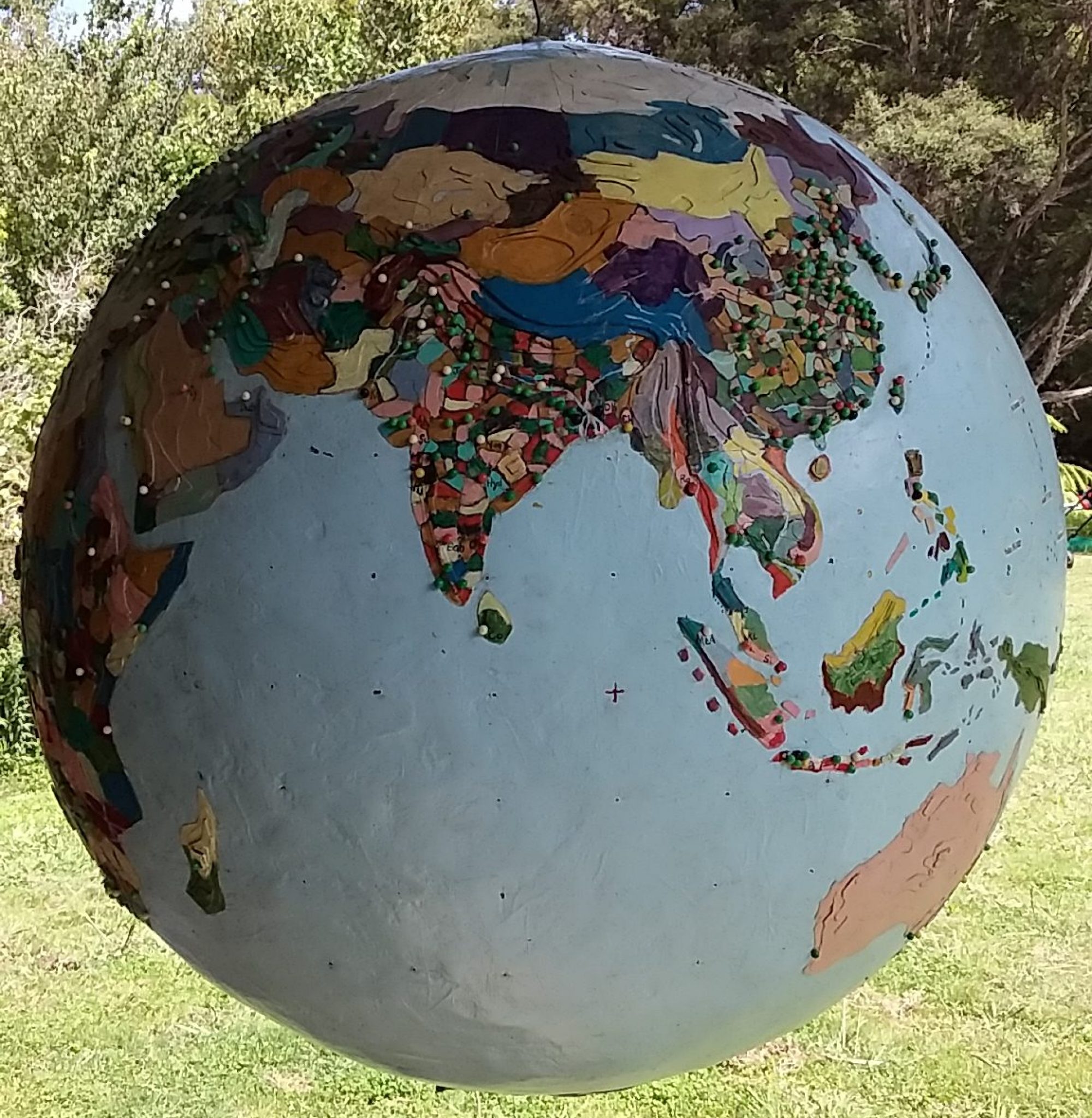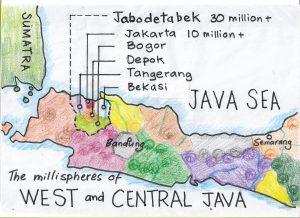Millisphere: a discrete region inhabited by 1000th of the world population
The island of Java is only slightly larger than New Zealand’s North Island and has a population of 145 million (2015). Java can be divided into twenty millispheres, the smallest in area is the city of Jakarta, ten million (2014).
Jakarta lies at the centre of a metropolitan sprawl of over 30 million. Viewed from the air a patchwork of orange tile and rusting corrugated roofs are punctuated with high-rise concrete towers and the odd remaining rice paddy and coconut palm.
I’ve flown into and out of the Soekarno-Hatta International Airport in Tangerang. Both times Jakarta was a shock. The first time we’d leisurely worked our way along Java before making a run for the airport from Bogor, on the periphery. On a motorway a truck had lost a load of concrete pipes and we experienced a legendary Jabodetabek traffic jam. Food and drink venders appeared through holes in fences and worked the captive market. We made our flight – just.
Flying in from New Zealand and dropping into an area about the size of Auckland, but with twenty times as many people, was shock again, but it is surprising how quickly you adapt to a new environment. Centrally holed up near Jalang Jalang, next to a slum built under a motorway flyover, pretty soon we were eating street food again.
The first thing Indonesians ask you is: “dari mana?” and we’d reply “dari Zeelandia Baru” (from NZ). After that it was “how many children do you have?” and then “what is your religion?” Indonesians have no concept of not having a religion.
I once told an Indonesian dowager that I was a “non-monotheist”. “What is that?” she asked. I explained that everyone has some sort of concept of a God, some people, like Hindus, have multiple Gods, therefore if you accepted everyone’s Gods, then there can’t be just one.
She thought about this for a while, drew herself up to her full height and said, “No! There is only one God and it is Allah!” Occasionally we ran into a fundamentalist Sunni preacher, rallying the gullible with a sound system, usually with lots of menacing reverb. You could pick up the vibe, and the odd word like “Satan” and “Amerika,” and it was usually time to cut a track.
On the 25th of January this year the former governor of Jakarta, “Ahok” Basuki was released from prison after serving two years for “blasphemy” for suggesting that the Koran didn’t say that Muslims couldn’t vote for non-Muslims. Ahok is a Christian and Chinese and the small, but influential, Chinese community is resented by many Indonesians. Ahok’s work stamping out corruption in the city bureaucracy had earned him enemies but his legacy is Jakarta’s “Smart City” initiative. Reports on smart-phones about crime, flooding, rubbish or potholes are now responded to in just over a day instead of the usual two weeks.
Last year a Buddhist woman who complained about the volume of the mosque loudspeaker was sentenced to eighteen months, also for blasphemy. Despite Indonesia’s secular, pluralist heritage, the coming Indonesian elections, in April this year, are being contested in the shadow of hard line Islam.
Social media smear campaigns have targeted the presidential incumbent, Joko Widodo (Jokowi), claiming he too is Chinese and a Christian. He’s not. He’s Javanese and a moderate Muslim but his campaign to stamp out corruption and modernise infrastructure also made him powerful enemies. In the hope of warding off Islamist political attacks Jokowi has chosen a Muslim Cleric, Ma’ruf Amin, as a running mate. Jokowi has been pressured to release from prison the radical muslim cleric Abu Bakar Bashir, who is the spiritual head of Jemaah Islamiyah (responsible for the Bali bombing) and supports Isis.
Running against Jokowi is his 2014 opponent, former army general Prabowo Subianto, the son-in-law of the late dictator, Suharto. Prabowo is accused of committing human rights abuses during his military career. Prabowo’s Gerindra Party is behind the Islamist social media attacks on Ahok and Jokowi. Prabowo is the Trump/Bolsonaro candidate.
Jakarta stands at a crossroads between becoming a smart city or a medieval caliphate. The path it takes will be determined in the April election, Gods willing.

